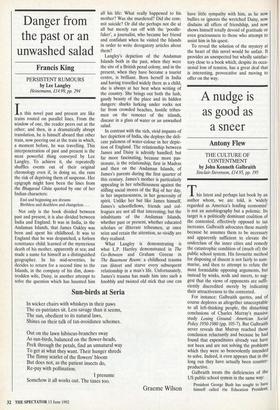Danger from
the past or an unwashed salad
Francis King
PERSISTENT RUMOURS by Lee Langley Heinemann, £14.99, pp. 294 In this novel past and present are like trains routed on parallel lines. From the window of one, the reader peers out at the other; and then, in a dramatically abrupt translation, he is himself aboard that other train, now peering out at the train in which, a moment before, he was travelling. This interpenetration of past and present is the most powerful thing conveyed by Lee Langley. To achieve it, she repeatedly shuffles events out of their original chronology even if, in doing so, she runs the risk of depriving them of suspense. Her epigraph might have been the lines from the Bhagavad Ghita quoted by one of her Indian characters:
End and beginning are dreams Birthless and deathless and changeless ...
Not only is the book divided between past and present, it is also divided between India and England. It was in India, in the Andaman Islands, that James Oakley was born and spent his childhood. It was to England that he was despatched, a forlorn remittance child; learned of the mysterious death of his mother, apparently at sea; and made a name for himself as a distinguished geographer. In his mid-seventies, he decides to return for a second time to the Islands, in the company of his dim, down- trodden wife, Daisy, in another attempt to solve the question which has haunted him all his life: What really happened to his mother? Was she murdered? Did she com- mit suicide? Or did she perhaps not die at all but merely ran off with the 'poodle- faker', a journalist, who became her friend and confidant when he visited the Islands in order to write derogatory articles about them?
Langley's depiction of the Andaman Islands both in the past, when they were the site of a British penal colony, and in the present, when they have become a tourist centre, is brilliant. Born herself in India and having travelled widely there as a child, she is always at her best when writing of the country. She brings out both the lush, gaudy beauty of the place and its hidden dangers: sharks lurking under rocks not far from crowded beaches, hostile tribes- men on the remoter of the islands, disease in a glass of water or an unwashed salad.
In contrast with the rich, vivid impasto of her depiction of India, she deploys the deli- cate paleness of water-colour in her depic- tion of England. The relationship between James and Daisy is adroitly handled; but far more fascinating, because more pas- sionate, is the relationship, first in Madras and then on the Andaman Islands, of James's parents during the first quarter of this century. James's mother is particularly appealing in her rebelliousness against the stifling social mores of the Raj of her day, in her impetuousness, in her generosity of spirit. Unlike her but like James himself, James's schoolfellows, friends and col- leagues are not all that interesting; but the inhabitants of the Andaman Islands, whether past or present, whether educated scholars or illiterate tribesmen, at once seize and retain the attention, so vividly are they realised.
What Langley is demonstrating is what L.P. Hartley demonstrated in The Go-Between and Graham Greene in The Basement Room: a childhood trauma can distort and starve every subsequent relationship in a man's life. Unfortunately, James's trauma has made him into such a knobbly and twisted old stick that one can have little sympathy with him, as he now bullies or ignores the wretched Daisy, now disdains all offers of friendship, and now shows himself totally devoid of gratitude or even graciousness to those who attempt to assist him in his quest.
To reveal the solution of the mystery at the heart of this novel would be unfair. It provides an unexpected but wholly satisfac- tory close to a book which, despite its occa- sional loss of tension, has a great deal that is interesting, provocative and moving to offer on the way.


















































 Previous page
Previous page